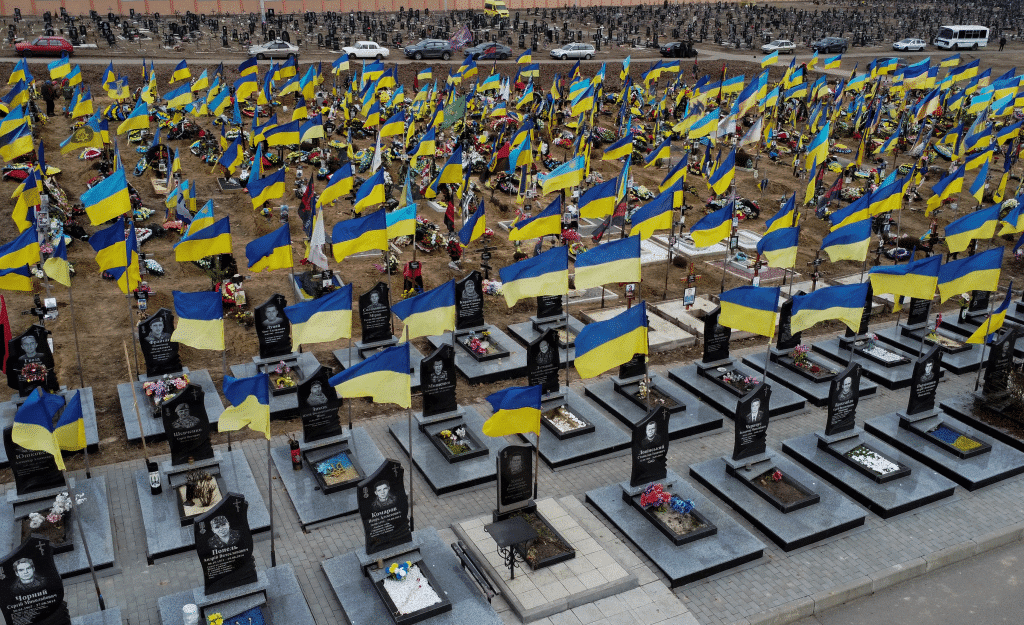I find it amusing how little western media have learned from their own reporting on the war in Ukraine.
Two years ago a mystic ‘Ghost of Kiev’ was allegedly shooting down Russian aircraft left and right. The ghost turned out to be a fake character. The Ukrainian air force had never had such successes.
Two years on it is still the same story. The Ukrainian government claims something and western media print it as if it had really happened.
When the claim is debunked, often sooner than later, its simply vanishes from the headlines.
Yesterday we had this media wave:
- Russian planes ‘destroyed’ in major attack on Morozovsk airfield – Telegraph
- Ukraine drones destroy six Russian warplanes in one of its biggest attacks of war – The i
- Ukraine claims it destroyed Russian warplanes in one of its biggest drone attacks of the war – AP
- Russia-Ukraine war live: 20 members of Russian airfield personnel killed or injured in drone attack, Kyiv says – Guardian
- Ukraine war latest: Ukraine strikes airfields in Russia, destroying or damaging 19 warplanes, sources say – Kyiv Independent
- OVERNIGHT ONSLAUGHT Ukraine launches massive drone attack destroying six planes & killing 20 Russian troops as ’60 explosions’ rock airbase – The Sun
The Russia side confirmed the attacks but denied any significant damage:
Rybar Force @rybar_force – 9:58 UTC · Apr 5, 2024
During the night, the AFU launched drones into Russian territory.
🔻The primary target was the Morozovsk airfield in the Rostov region, where Ukrainian forces dispatched 44 drones. The exact type remains unknown and will be determined upon analyzing the debris. However, there is a high likelihood that these are the same UAVs that the enemy has been utilizing in recent weeks.
Out of these, 26 drones were intercepted by Pantsir-S1 air defense missile systems, and 18 by rifle squads. Based on the videos circulating online, it is evident that the drones were flying at an extremely low altitude, enhancing the level of stealth.
There was no significant damage to the infrastructure. The debris hit a few buildings. Additionally, the substation suffered damage, resulting in a temporary power outage.
…
❗️ Thanks to the swift response of the air defense crews, any severe repercussions from the attacks were averted – claims from Ukrainian sources about the alleged destruction of six aircraft are fakes coming from enemy propagandists.
The Russia claim of no significant damage has been confirmed by the anti-Russian Institute for the Study of War:
ISW has yet to find any visual evidence that Ukrainian forces have damaged or destroyed aircraft or infrastructure at any of the four Russian airbases targeted by drones on the night of 4-5 April.
Such news cycles of fake claims of alleged Ukrainian successes are a major reason why some in the western public still believe that the Ukraine can win the war.
That is however not the case. The situation requires a change of attitude:
Instead of a new approach, the old pattern continues: NATO mulls over how to help Ukraine without provoking open war with Russia and fails, in the end, to deliver the kind of decisive assistance needed to turn the course of the war.
Another established pattern is the repetition of moralistic binary language. The West “cannot let Russia win.” The “rules-based order” could unravel. Then there is the new domino theory: if Ukraine falls, Russian hordes will flood further west. The personalization of the conflict onto one evil man, Vladimir Putin, continues with the death of Alexei Navalny. It is a Manichean struggle of good and evil, democracy and authoritarianism, civilization and darkness. There can be “no peace until the tyrant falls.” The Western alliance must not waver in its commitment to Ukraine.
…
The lack of realism in Western discourse is clear. There is indeed a serious risk that, rather than the West teaching Russia a lesson and putting Putin in his place, the opposite may occur. Is Russia, in fact, educating the West on what it means to use hard power and wage interstate conflict in twenty-first-century conditions? Russia advertises its version of great power sovereignty, in which a united, resilient, and unwavering state can defeat the pooled sovereignty of the EU and NATO.We have all heard the objection that Putin simply cannot be trusted and that he wants nothing less than the complete elimination of Ukraine as an independent state. Yet, does not the blind continuation of the West’s dysfunctional Plan A also threaten the total physical destruction of Ukraine? It is for this reason that Pope Francis has called on Western leaders not to be “ashamed to negotiate before things get worse.”
A new approach to the war in Ukraine will not emerge from rhetorical and moralistic proclamations. Words alone will not prevent a Russian victory. What is needed is a clear accounting of what can be realistically achieved with the means available, as well as the cost, risks, and benefits of different scenarios. Trying what has failed before and expecting new results is, after all, not a recipe for success.
I see no appetite in any western nation to really intervene in the war and to experience the Russian wrath that any intervention force would be submitted to.
But the current crop of western ‘leaders’ is too committed to the failed case for Ukraine they now have made for more than two years. For now they are likely to try to just muddle through.
We will have to wait for some ‘regime change’ for a return to sanity and realism.
Reprinted with permission from Moon of Alabama.


